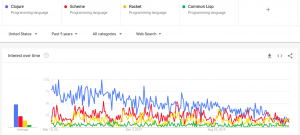 The Clojure and Scheme Compared comments about Peter Bex's Clojure from a Schemer's perspective article caught my attention. I know that discussion is about language features, but it got me thinking about the different criteria used for selecting a programming language like Clojure. E.g., it's interesting that Irreal considers the JVM a negative, while I consider it a positive. It just goes to show that every situation is unique, i.e. there is no right or wrong in these types of technology decisions.
The Clojure and Scheme Compared comments about Peter Bex's Clojure from a Schemer's perspective article caught my attention. I know that discussion is about language features, but it got me thinking about the different criteria used for selecting a programming language like Clojure. E.g., it's interesting that Irreal considers the JVM a negative, while I consider it a positive. It just goes to show that every situation is unique, i.e. there is no right or wrong in these types of technology decisions.
I've only dabbled with Clojure over the last few years. See Exploring Clojure (and FP vs OOP). The real motivation was to explore the advantages of functional programming. Shifting your fundamental programming paradigm from OOP to FP has far-reaching impact. Language warts are not going to be a major factor in determining your success in doing this type of transformation.
The other major language/technology selection considerations involve organizational headwinds. For most large companies, there are three major challenges:
- Inertia. Convincing management that an esoteric language and techniques (FP) are worth diverting and training existing personnel is a difficult hill to climb. I also think there's a certain amount of organizational entrenchment going on here. For example, the C#/CLR vs. Java/JVM divide is really more cultural than technical. Because niche technologies like Clojure/FP are also generally viewed in this cultural context ("esoteric"), they don't stand a chance.
- Talent. Unless you're in Finland, it's difficult to find qualified people. This is also an on-going issue because programs developed today need to be maintained for the long-term (years). With all-remote employment now being more mainstream, maybe this will become less of an issue.
- Trends. As you can see from the 5-year trends below, Clojure has been on a slow decline. Also, Lisp languages are minor players. They are orders of magnitude smaller than the mainstream (Java, JavaScript, Python) and do not show up on the TIOBE top 20 lists (Lisp is #36).
Even if you're a small company or a startup, selecting Clojure is still a tough call. This would likely only happen if there were a critical mass of programmers (#2) that already had positive Clojure/FP development experiences.
There are many good reasons to choose Clojure as a front-end (JavaScript) and/or back-end (JVM) technology solution. I would love to see first-hand how well Clojure/FP performs on a large-scale project. Unfortunately, there are also plenty of non-technical reasons that prevent organizations from choosing Clojure.

